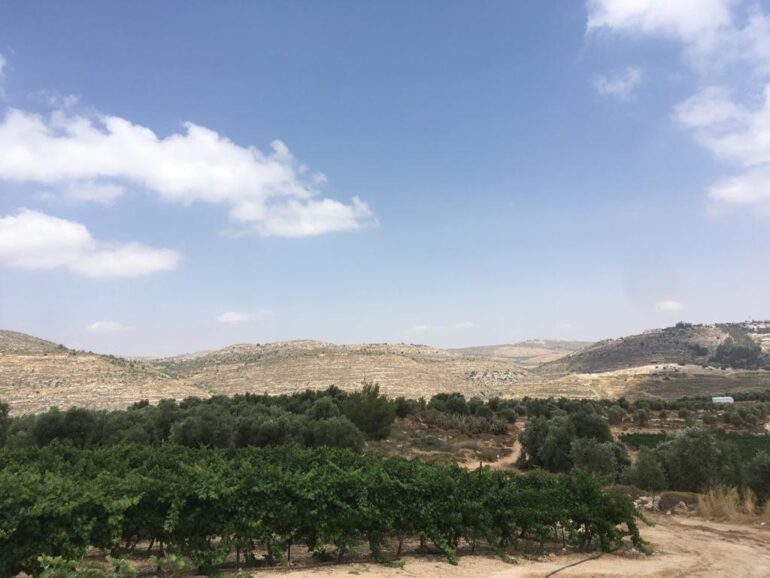United States President Donald Trump’s senior advisor Kellyanne Conway told journalists on Wednesday that Trump is preparing a big announcement pertaining to Israel applying sovereignty to parts of the West Bank, in accordance with his administration’s “Deal of the Century.”
According to the Trump plan, Jerusalem will be permitted to legally annex 30% of the West Bank to Israel while relinquishing claims to the rest of Israel’s central mountain region to facilitate the creation of a demilitarized Palestinian state within four years.
US and Israeli officials are reportedly still working to finalize the map intended to determine final borders.
“There are conversations being had in the White House on the matter of annexation,” Conway said. “Obviously the president will have an announcement. He’s talked about this in the past and I’ll leave it to him to give you a big announcement.”
Conway’s statements to the press came as US Ambassador to Israel David Friedman was in DC to meet with Secretary of State Michael Pompeo, Trump’s special adviser and son-in-law Jared Kushner, and special representative for international negotiations Avi Berkowitz.
The meetings were intended to determine the parameters of support the administration will give to Israel’s sovereignty moves but Friedman is reportedly already traveling back to Israel without a final decision.
According to the coalition agreement reached between Prime Minister Binyamin Netanyahu’s Likud party and Benny Gantz’s Blue & White faction in April, US approval is actually required in order for Netanyahu to move forward with annexation. The agreement, brokered with help from the Trump team after three national elections in one year, stipulates that the prime minister can bring sovereignty to a vote starting on July 1 only on condition he does so with Washington’s approval.
Israeli Minister of Higher Education Z’ev Elkin (Likud) actually stated this publicly during an interview with KAN Radio Wednesday morning, disclosing that Jerusalem will need to obtain US approval in order to apply Israeli sovereignty to any portions of Samaria, Judea or the Jordan Valley.
“According to the coalition agreement, we can advance sovereignty on condition that we have the approval of the United States,” he acknowledged.
The senior Likud minister emphatically rejected any possibility that Israel could apply sovereignty without a green light from Trump.
“If the US says ‘no’, to my sorrow, the coalition agreement restricts us here. We respect our agreements, so we won’t be able to advance sovereignty.”
Prime Minister Netanyahu is meanwhile under pressure from nationalist rabbis and public figures, including many leaders of the Yesha (Jewish Communities in Judea and Samaria) Council, to apply sovereignty to the territories irrespective of Washington’s permission.
Some have gone so far as to press Netanyahu to apply sovereignty outside the context of the Trump plan and not limit annexation to only 30% of the territories.
Samaria Regional Council leader Yossi Dagan, who has been outspoken against Trump’s “Deal of the Century” for designating 70% of the West Bank for a Palestinian state, called the idea of partial Israeli sovereignty “Israebluff.”
Dagan further called on Netanyahu to reject Trump’s map, which he warned would lead to a building freeze and subsequent destruction of 15 Jewish communities.
Member of Knesset Betzalel Smotrich (Yamina) is meanwhile launching a new campaign that compares the current Israeli political climate with the one that existed in the months leading up to Ariel Sharon’s 2005 expulsion of all Jews from the Gaza region.
The new campaign compares Netanyahu with Sharon, who submitted to US President George W. Bush’s demands that he demolish over two dozen Jewish communities and relinquished all of Gaza.
“We are at a critical crossroad in which we can seize this historic opportunity for sovereignty or head down the same problematic path that will divide the nation,” Smotrich said.
As the Trump administration decides what their final map will look like and whether or not they will grant Netanyahu permission to move forward with annexation by July 1, it’s important we express a principled rejection of the Trump plan in its entirety.
We must resist Trump’s plan not only because it forces Israel to relinquish claims to most of Judea and Samaria, but also for the reasons any self-respecting nation that considers itself free would reject the very notion of a foreign government dictating policies or imposing borders.
Beyond this, we should reject the Trump plan because it’s actually just another US attempt to divide our country into two states, each dependent on Washington for survival.
Like all previous foreign attempts to “solve” our conflict, Trump’s plan doesn’t take into consideration the core grievances or aspirations of Jews or Palestinians on the ground, but instead seeks to balkanize the country by drawing arbitrary lines disconnected from the identities, narratives and sensibilities of the country’s native peoples.
Jerusalem must issue an emphatic “no” to the Trump plan while at the same time beginning a process of applying Israeli sovereignty to 100% of the West Bank – something that can best be achieved by attaining the one thing no one from the national camp seems ready to entertain: Palestinian buy-in.
Palestinian buy-in shouldn’t be as difficult to obtain as most Israelis might think. But it would require a meaningful improvement in the way Palestinians experience Israel – we would essentially need to change the role we play in the story they’re living in, which would require us to change central features of how Israeli society thinks about about our connection to our land and to non-Jewish populations here.
Until now, the arguments we frequently hear from Israel’s national camp often focus on the Jewish right to Judea and Samaria. We need to drop this paradigm of rights and shift towards an understanding of our obligations to this land – from the river to the sea.
Israel can’t relinquish even an inch of territory because we are obligated to ensure that there be justice in the entire land. This obviously requires full Jewish sovereignty but it also means actually taking responsibility for Palestinians and their wellbeing rather than treating them as unwanted hostiles.
If Jewish nationalists loyal to Eretz Yisrael can unite with the growing number of Palestinian one-staters in favor of an alternative – even if not fully formulated – to partitioning the land, the US and its allies would lose all moral legitimacy for pushing imperialist solutions on our country. This, more than any other path, would effectively bury the two-state paradigm.
The first step, as has been argued by Vision Magazine on several occasions, should be taking responsibility for civil servant salaries.
Palestinian teachers, firefighters, hospital workers and bus drivers should all start receiving Israel paychecks in their mail boxes each month at the same level as what Israelis who work these same jobs are paid (roughly four times what these Palestinian workers currently earn). Such a move would not only serve to soften Palestinian attitudes towards Israel but would also completely undermine and marginalize the Fatah-led Palestinian Authority, which only holds any influence due to the fact that it pays so many salaries.
After six to eight months of Palestinian civil servants getting both an Israeli and PA paycheck, Israel can let each individual worker decide which check they’ll want to continue receiving (dismantling the Western-backed PA will in any case be necessary if Israel aims to assert sovereignty over the entire West Bank).
Additional follow up steps should include providing healthcare and education, dismantling oppressive structures (the wall, checkpoints, etc.) and beginning a process to fully absorb Palestinians into Israel as equal citizens with real legal means to influence the structures and policies they live under.
In short, Israel can obtain Palestinian buy-in to one-state reality between the river and the sea simply by behaving justly, in accordance with the laws and values of our people (our response to any security threats that might arise should of course be equally inspired by those same laws and values).
This is what Jewish sovereignty over our land actually looks like – taking responsibility for all of our country’s inhabitants while providing for their material needs and ensuring them a dignified place in our society.





